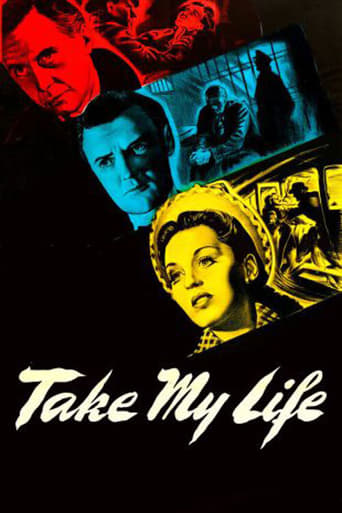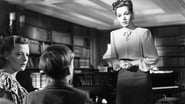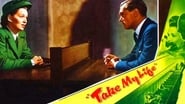kapelusznik18
****SPOILERS**** Based on the forgettable Winston Graham novel by the same name the movie has to do with the murder of violinist Elizabeth Rusman, Rosalie Cuuchley, who's body was found burned to a crisp to conceal her identity from the police by her murdered. The man arrested for Rusman's murder just happened to be the husband of the opera singer Philippa Shelly, Greta Gynt, who was back up ,in playing the violin, in the Oprah that she was playing in Nick Talbot, Hugh Williams. After Philippa accused Nick of making eyes at Rusman they later had a spat where she hit him over the head with a hair brush causing a deep gash in his skull. Not being or willing to explain the injury to the police to avoid embarrassment and being in the present with Rusman just before she was found murdered Nick is arrested and made to stand trial for her death.We have Nick's wife Philippa now checking out all the clues to Rusman's murder that leads her to the private music school in the boondocks that it's suspected Rushman spend the year before as a music teacher. With the principle of the school Sidney Flemming, Marius Goring, not that cooperative Philippa finds the missing photo-Of Rusman- of the year before graduation class that he hid from her. That turned out the piece of evidence that can connect him not only with Rusman as man and wife but the reason behind her murder.***MAJOR SPOILERS**** With Rusman's killer's identity, as her husband Sidney Felmming, exposed he attempts to throw Philippa off a speeding train, on her way back to London, but he's interrupted briefly by this deft man looking for the bathroom or "John" to relive himself who "herd" his confession to Philippa about doing his unfaithful wife Rusman in. That's because her divorcing him would ruin his career in both politics as well as the world of music. It turns out that Flemming now seeing the writing on the wall jumped off the train to his death before the police could arrest him. But it also had Philippa who was with him at the time of him jumping or being pushed off the speeding train in hot water by being arrested for his murder. That's until the deft man turned out to be the not so deft undercover Det. Sgt. Hawkins, Roland Adams, who's testimony totally exonerated Philippa of Flemmings murder!
Flash Sheridan
I agree with most of the other reviewers on how stylishly this film is acted and directed. But the (predictable spoiler warning) misleading coincidences leading to the false accusation are too unlikely to be believable; I'm afraid the protagonist must have been guilty. And the further coincidences leading to the supposed bad guy are so implausible, and the obstacles facing the intrepid but dim heroine so preposterously handled, that suspension of belief is impossible.
jadedalex
I found this a very quick-paced thriller. Neame's camera work found fresh ways to do clichéd scenes. So many movies are described as 'Hitchcockian', but rarely deliver the Master's unique touch. I don't find Neame's work here a ripoff of Hitch's genre, but rather an homage to the great director.Like Sir Alfred, Neame has the wrong man accused of murder. In fact, male lead Hugh Williams is quite ineffectual at any sort of defense, since the movie opens with him on trial for murder and quickly found guilty. That the fine British character actor Francis L. Sullivan is given such a short role as prosecuting attorney is fine with me. He is cleverly used to state his case against the defendant, leading into flashbacks of the drama as it really happened.This leaves the lovely Greta Gynt to portray opera star and first class detective. Yet another Hitchcock theme is revealed as the cops and the justice system yet again fail an innocent man. It's up to Ms. Gynt to sort out the clues that lead to the real killer.The train sequences definitely reminded me of Hitchcock's 'The Lady Vanishes', and there is a plot twist near the end which is quite delicious.I suggest that previous reviewers who found nothing interesting in this movie must have been half asleep during their viewing. I was riveted by Neame's work with the camera, and it's definitely a movie worth a second look. Williams as the male lead is fairly useless, a handsome man who could easily be taken as a ne'er do well living off his wife's successful operatic career. So it is up to the strong performance of Gynt's character to drive the story to its compelling end.This movie has been described as 'film noir', but I see it as more of a 'thriller'. And like the best of Hitchcock's suspense films, this one delivers.
robert-temple-1
This is a superb example of a high-calibre British postwar murder mystery. It was the first film ever directed by Ronnie Neame, who is mostly famous for his classics 'Tunes of Glory' (1960) and 'The Prime of Miss Jean Brodie' (1969). The cinematography by Guy Green (later a director) is inspired and intensely expressionist in the German manner. Neame really shows what a brilliant director he was, not only coaxing excellent performances out of his actors, but keeping the pace and the tension despite the fact that the identity of the murderer is revealed very early. Francis L. Sullivan is, as usual, hair-raising as the prosecuting counsel, although his role should have been more prominent if the film had not been so short at only 76 minutes. (One suspects things were cut out before release, as the buildup of Sullivan really does fizzle out without explanation.) The scenes towards the end of the film really do become incredibly menacing and powerful, as Marius Goring, who plays the murderer in an eerie and intense style, can be seen calculating what he must do next, and sets about it with the methodical determination of a man who now has nothing to lose. Hugh Williams is excellent as the rather formal husband of Greta Gynt, an equally formal wife who is an opera star. It is difficult for such people to cope with real situations of danger, as their behaviour is so mannered, even in their most private moments, that quick thinking and quick action are impossibilities for them, what with all the thawing out they have to do first, not to mention the necessity of changing for dinner, straightening the black tie, and making sure every hair is in place. Sometimes when your life is in danger, such formalities can be rather impeding! But that is part of the irony of this tale, of which a subliminal motif is: things like that don't happen to people like us. In this film, the doomed victim is Rosalie Crutchley, who really was a fascinating wench at that early age, in fact, someone to whom you can imagine almost anything could happen, and it does.






